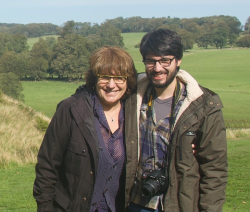CIESAL article on the use of Ivermectin in COVID patients was the highest impact article of 2021 in important British journal
8/03/2022In February of this year, the British Medical Journal Evidence-based Medicine informed two CIESAL researchers, Nicolás Meza and Eva Madrid, that an article in which they participated (Misleading clinical evidence and systematic reviews on ivermectin for COVID-19), was the article with the greatest number of visits or accesses and the greatest diffusion in news or social media networks of all articles published by the journal last year. The article was tweeted 2,853 times and reported in major media such as The Guardian and NBC News.

In the photo: Nicolás Meza and Eva Madrid.
In March 2021, both researchers had decided, together with Luis Garegnani, an Argentine collaborator, to write about the extremely controversial subject of the use of ivermectin for COVID patients. The use of this antiparasitic had been promoted by a few clinical groups around the world, and had been incorporated in many places as routine use, in circumstances where there was no evidence to indicate that its use could be effective.
During 2020, in a frantic search for treatments for COVID-19, a group of researchers led by Leon Caly had carried out an in vitro study in Melbourne, Australia, that demonstrated the inhibitory role of ivermectin on the replication of the SARS -CoV-2 virus. Following this, a considerable number of non-peer-reviewed articles (preprints) and protocol registries quickly appeared, reporting the clinical efficacy of standard-dose ivermectin for COVID-19. The dissemination of these results caused much confusion among clinical professionals and the general population, and even led to the endorsement of the use of ivermectin in hospitals and guidelines, especially in Latin America. However, within days of Caly’s publication and its repercussions, a general publication of the Pan American Health Organization stated that “… ivermectin is being used incorrectly for the treatment of COVID-19, without any scientific evidence of its efficacy and safety for the treatment of this disease”.
An important and controversial point to note, which was highlighted in the article by Garegnani, Meza and Madrid, is that the concentration of ivermectin observed in vitro to be required to achieve an anti-SARS-CoV-2 effect was 5 µM, whereas the maximum reported plasma concentration achieved in vivo has been 0.28 µM, and this has been achieved with a dose of approximately 1700 µg/kg (around nine times the FDA-approved dosage). In this sense, there are no solid foundations to recommend the use of ivermectin in COVID-19 at a clinical level.
The article raised clear points with a solid basis, which helped to demolish the myth around the use of this antiparasitic, and it was used and referenced by many researchers for its relevance for decision-making during the pandemic.



